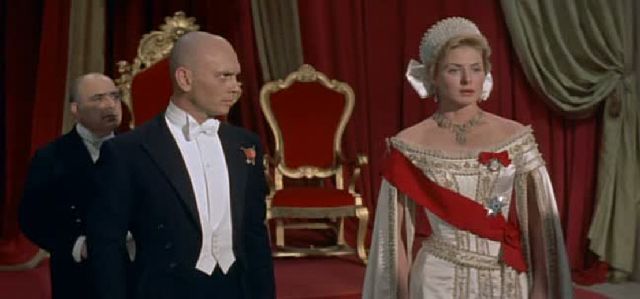Anastasia (1956) 
“From the sensational Broadway stage success that had audiences crying its acclaim!”

Director: Anatole Litvak
Cast: Ingrid Bergman, Yul Brynner, Helen Hayes
Synopsis: An opportunistic Russian businessman tries to pass a mysterious impostor as the Grand Duchess Anastasia. But she is so convincing in her performance that even the biggest skeptics believe her.
The myth that the Grand Duchess Anastasia Nikolaevna of Russia, the youngest daughter of Emperor Nicholas II, survived the execution of the Romanov family during the Russian revolution was an enduring one for most of the 20th Century. Anastasia’s remains were found with those of eight others of her family in Ekaterinburg in 1991, finally bringing speculation to a conclusion, but when Anatole Litvak’s screen adaptation of the hit Broadway stage play by Marcelle Maurette was released in 1956, the mysterious fate of Anastasia was still very much in the public eye.
The film takes place in Paris in 1928, ten years after the Romanovs were slain. Rumours circulate amongst the exiled Russian aristocracy that Anastasia, the Tsar’s youngest daughter survived the slaying. The rumours endure partly due to the fact that £10 million left by the Tsar in an English bank still waits to be claimed, which has resulted in any number of con men and opportunists producing fake Anastasias in an attempt to get their hands on the inheritance. One of these opportunists is former White Russian General Bounine (Yul Brynner), who, together with fellow emigres Boris Chernov (Akim Tamiroff and Piotr Ivanovich Petrovin (Sacha Pitoeff), is part of a syndicate established to locate and groom a suitable candidate for the part. Their attention turns to Anna Koreff (Ingrid Bergman, returning to Hollywood after an eight year exile following her scandalous relationship with Italian director Roberto Rossellini), a refugee in Paris who once claimed to be Anastasia while recovering in a Rumanian mental hospital. Anna is initially a reluctant recruit into their scheme, even though she still claims to be Anastasia and bears an uncanny resemblance to the girl, who was 17 when the Romanovs were killed. But eventually she capitulates under the forceful persuasion of Bounine with whom she develops an intense love-hate relationship.
Attempts to convince the Russian aristocracy prove inconclusive, and so Bounine decides they must somehow convince the Dowager Empress Marie Feodorovona (Helen Hayes, who was awarded the part when she was mistaken for the British actress Helen Haye, who played the part in a British TV production of the story) of the authenticity of Anna’s claim. However, the Dowager is a crusty old dame who has grown inured to the repeated attempts of fraudsters to get their hands on the family fortune, and she initially refuses even to meet with Anna.
There’s a pleasing ambiguity about Arthur Laurents’ screenplay for Anastasia which always leaves us unsure about the veracity of Anna’s claim. In fact, she herself seems occasionally uncertain about her true identity, with perceived memories becoming confused with the overbearing Bounine’s meticulous tuition on every tiny detail of the young Duchess’s life. Bounine and his cohorts are, in fact, entirely fictional and so the story is only very loosely based on truth which, of course, frees any writer to embellish to their heart’s content, so it’s to Laurents’s credit that the film remains a sober account of Anna’s claim without ever feeling dry or forced. And while he finds it impossible to entirely disguise the story’s stage origins, the quality of the performances from Bergman and Brynner are strong enough to facilitate such a wordy screenplay. However, given the strength of both of their performances, its sadly surprising at how little chemistry is created between them.
(Reviewed 20th October 2013)
httpv://www.youtube.com/watch?v=0BEH9LMAMjE
